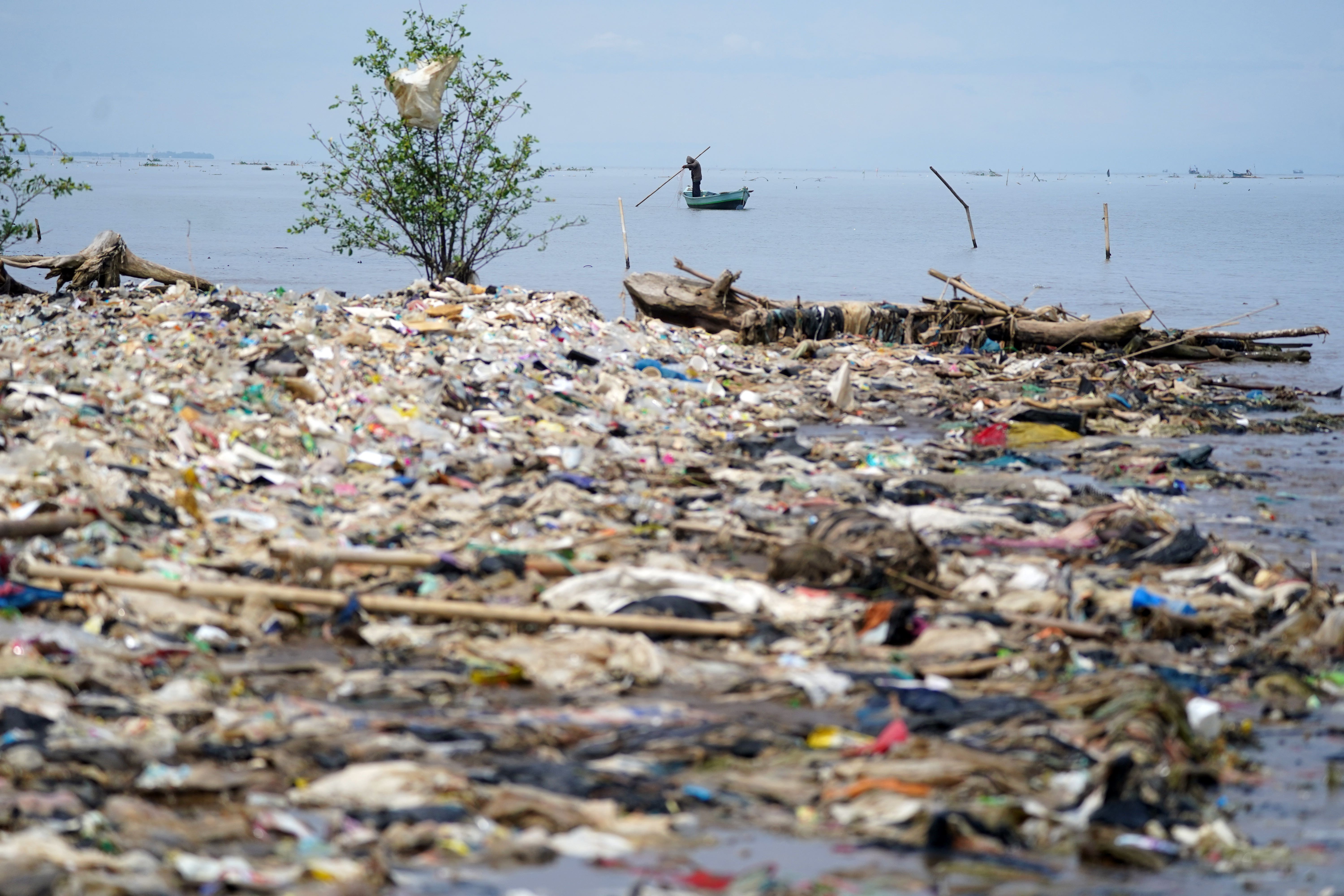Countries urged to be ambitious in final push for UN plastic pollution treaty
Negotiators are meeting in Busan, South Korea, for talks to agree a global plastic pollution treaty.

Negotiators making a final push to secure the world’s first treaty to combat plastic pollution are being urged to strike an ambitious deal at talks this week.
A final round of UN negotiations on a legally binding international agreement to curb plastic pollution kick offs in Busan, South Korea, on Monday, amid warnings that some countries are pushing for a less ambitious outcome that focuses on cleaning up the problem rather than curbing production.
The UK is part of a “high ambition coalition” of countries which have signed up to calls for binding obligations on reducing production and consumption of plastics, sustainable product design and environmentally sound management of plastic waste and clean-up of plastic pollution.
The Environment Department (Defra) has also convened a roundtable of businesses, which signed a statement backing a treaty which includes measures to achieve “sustainable levels” of production and consumption, tackle “chemicals of concern” and create a level playing field.
We urgently need an ambitious international agreement to end plastic pollution by 2040
The statement setting out the key elements the treaty must include to end plastic pollution by 2040 has been signed by companies including Nestle, Mars, Danone, SC Johnson, Tesco and Unilever.
Ahead of the negotiations, Environment Secretary Steve Reed said: “For too long, plastic has littered our ocean and threatened our wildlife.
“We urgently need an ambitious international agreement to end plastic pollution by 2040 to promote a circular economy where we reduce waste and clean up our environment.”
According to Our World in Data, plastic production has increased sharply over the last 70 years.
The world has gone from producing two million tonnes in 1950 to more than 450 million tonnes today, as use for everything from home appliances to food packaging and plastic bags has soared.
But just 9% of the world’s plastic waste is recycled, while just under half is landfilled, 19% burned and 22% is mismanaged – with the risk it ends up in the countryside, rivers, lakes and oceans, figures from the OECD show.
Once in the environment, plastic waste can entangle, choke or be eaten by wildlife and livestock, clog up waterways and litter beaches.
Bigger items break down into microplastics that are now found from the deepest depths of the ocean to the Arctic and Mount Everest, widely entering food chains.
Among recent research on the impact of microplastics are findings from the British Antarctic Survey (BAS) that the presence of tiny “nanoplastics” in seawater could reduce the vital ability of Antarctic krill to store carbon in the deep ocean.
And producing plastic, primarily from fossil fuel oil, has a climate impact, with 3.3% of global emissions down to the production and management of global plastics, according to the World in Data and OECD.
Many countries have taken various steps to curb plastic pollution, such as in the UK where “plastic bag taxes” have driven down carrier bag use, and have been followed by bans on single use items including straws, cotton buds, cutlery and polystyrene takeaway boxes.
If negotiators hope to achieve a successful outcome, then firm commitments to reduce plastic production must be at the heart of discussions
But experts say the problem is a global one and so the solution must be too.
Speaking to the PA news agency in the run up to the final round of negotiations, Dame Ellen MacArthur, founder of the Ellen MacArthur Foundation, which works with businesses and governments to drive the transition to a circular economy, said the treaty negotiations were a “once-in-a-lifetime opportunity to set some global rules for plastic which help to shift us towards a circular economy”.
Businesses have called for global rules and a level playing field, she said, adding: “We need countries to match it and go for as ambitious a global treaty as we can to bring some stability to the investment that’s needed for that sector as a global economy.”
Christina Dixon, ocean campaign leader for the Environmental Investigation Agency (EIA) said there was an urgent need for convergence on central issues including reducing production, design and manufacture, and finance, to support the scale of the needed transition.
A major hurdle is vision and political will, she said, with a small but vocal group of countries pushing for dealing with plastics at the end of their lifecycle, while a truly ambitious treaty would set a global target for production reduction and legally binding measures for countries to meet it.
“We’re heading into our final chance for this once-in-a-generation opportunity to address the plastic pollution crisis at a global scale.
“If negotiators hope to achieve a successful outcome, then firm commitments to reduce plastic production must be at the heart of discussions.
“The evidence at this stage is simply irrefutable – we need to peak plastic now if we are to stand any hope of reversing the current trajectory of pollution and the associated impacts on climate, health and biodiversity,” she said.
And Laura Burley, project leader for plastics at Greenpeace UK, said the talks could be a “real turning point” in the fight against plastic pollution, though she warned fossil fuel and petrochemical lobbyists would be pushing against action to curb production.
“It is a once-in-a-generation chance to turn off the tap on plastic and instead prioritise our health, our communities, our climate and our planet,” she said, calling on governments to push for “a strong and ambitious agreement that supports cuts to runaway plastic production through binding, global rules”.